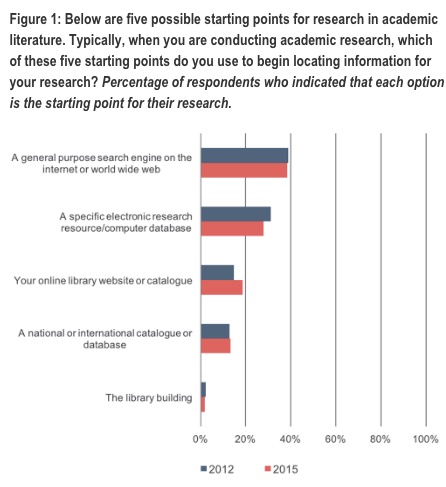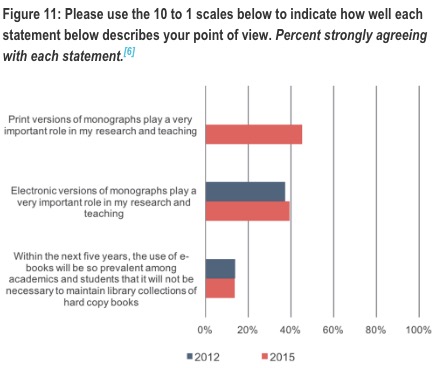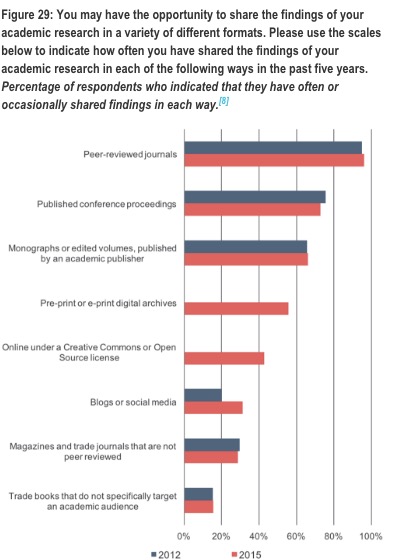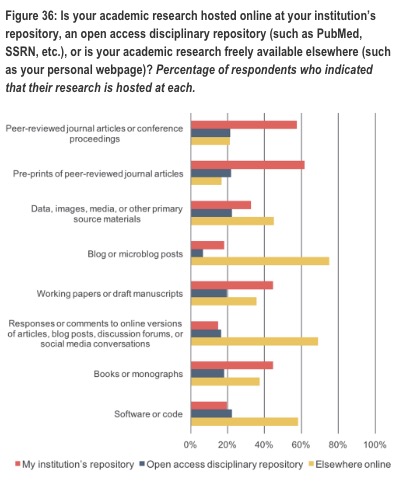Research Practices of UK Academics 2015 Findings Published by Ithaka S+R, JISC, & RLUK
Note: Ithaka S+R published findings from the 2015 U.S. Faculty Survey on April 4, 2016.
From an Introductory Blog Post by Roger Schonfeld:
Today, Ithaka S+R is releasing the UK Survey of Academics, with our partners Jisc and RLUK. Fielded in autumn 2015, this is the second cycle of this project and therefore the first opportunity to examine trends over time. It uses a large-scale sample of academics from across the UK higher education sector. In addition, nearly a dozen individual institutions partnered with us to provide targeted help to ensure that our survey reached their academics.
Given that the survey is run in parallel with the US Faculty Survey, there are important comparative opportunities. One of those that I want to highlight is some evidence of the impact of recent funder mandates within the UK. We found evidence suggesting that funder priorities related to data preservation, open access for journal articles, and outreach to non-academic audiences, were all having an impact:
- We saw a substantial increase in the share of respondents that preserves their research data in a repository and a corresponding decrease in the share that preserves data themselves.
- There has been an increase in the share of respondents that received assistance making their research outputs freely available online.
- UK respondents more frequently share findings freely available online, in pre-print or e-print digital archives, and/or online under a Creative Commons or Open Source license as compared with their US peers.
- A growing share of respondents seems to be adding non-academic audiences to those they seek to reach with their research.
Read the Full Text of Schonfeld’s Blog Post
Key Findings From the Report
- Respondents from RLUK institutions and non-RLUK institutions differ in the ways in which they access materials used for research and teaching. Respondents from non-RLUK institutions identified all sources for accessing journal articles and monographs as more important than did those from RLUK institutions with one exception; respondents from RLUK institutions more highly value their college or university library’s colleges or subscriptions.
- Academics’ preference for using scholarly monographs in various ways in print format rather than digital format has only increased since the previous cycle of the survey; we have not observed a trend towards a format transition for monographs.
- Since 2012, there has been a substantial increase in the share of academics that shape their research outputs and publication choices to match the criteria they perceive for success in tenure and promotion processes.
- There is growing interest from academics in reaching audiences outside of those in academia with their research. Since the 2012 survey, we have seen substantial increases in the share of respondents who indicated that professionals outside of academia, undergraduate students, and the general public were very important audiences to reach with their research.
- Respondents from non-RLUK institutions consistently rated support services for research dissemination provided by their college or university library as more valuable than did those from RLUK institutions.
- There has been a substantial increase since 2012 in the share of academics that preserve their research data in an institutional or other type of online repository and a corresponding decrease in the share that preserves these data themselves using commercially or freely available software or services. Additionally, there has been an increase in the share of academics that have received assistance, from their university library or elsewhere, with making a version of their research outputs freely available online.
- We have observed noteworthy increases since the previous survey cycle in the importance that academics assign to the service-based roles of the library, as compared to those that are collections-based. In particular, there has been a substantial increase in perceived importance of the role of the library in helping undergraduate students develop research, critical analysis, and information literacy skills.
Direct to Full Text Report ||| PDF Version of Report (106 Pages; PDF)
Filed under: Academic Libraries, Archives and Special Collections, Data Files, Digital Collections, Journal Articles, Libraries, News, Open Access, Preservation
About Gary Price
Gary Price (gprice@gmail.com) is a librarian, writer, consultant, and frequent conference speaker based in the Washington D.C. metro area. He earned his MLIS degree from Wayne State University in Detroit. Price has won several awards including the SLA Innovations in Technology Award and Alumnus of the Year from the Wayne St. University Library and Information Science Program. From 2006-2009 he was Director of Online Information Services at Ask.com.






